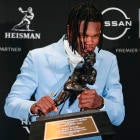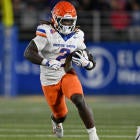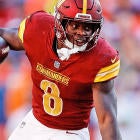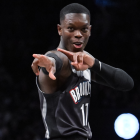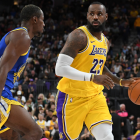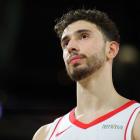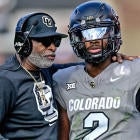
NEW YORK -- A restaurant on Manhattan's West Side on a late summer evening serves as a gathering point for some of the most accomplished female sportscasters in the country, who had much to celebrate. A decade ago, a meeting like this was just an idea.
"Lesley [Visser] and I used to talk, amongst others," Andrea Kremer, the Emmy award winning sports journalist said. "We always talked about sports. We would talk all the time about: Why isn't there The View for sports?"
That was the foundation for the idea that eventually became We Need to Talk, CBS Sports' first-of-its-kind all-female sports talk show now celebrating its 10th year with an episode at 1:30 p.m. ET Saturday on CBS. It was a long-gestating project pitched primarily by Visser, a trailblazing sports journalist, and director Suzanne Smith that took multiple iterations -- and faced multiple rejections long for various reasons before its first episode aired a decade ago.
The show found a home with CBS Sports, where a well-rounded vision was executed in a way few women-centric ventures in sports have. The women who create the show on a regular basis were also included in its formation from the start -- Smith said she was in meetings that directors do not usually attend, and name-dropped ex-tennis professional and executive Katrina Adams as a fellow attendee. The collaboration paved the way for a show that is not just hosted exclusively by women but is stitched together by an all-female control room, a regular feature rather than the one-off that remains the industry standard.
We Need to Talk tapings are an all-star assembly of female broadcasters, essential to create a quality program as well as ensure a first-of-its-kind program would have any longevity. Kremer's list of accomplishments includes being one half of the first all-female team to call an NFL game, while Visser's includes being the first woman to serve as a beat reporter for one of the league's teams. Other hosts of the show include Sara Kustok, the first full-time female analyst for an NBA team's local broadcast partner, as well as a slate of iconic female athletes like WNBA legend Lisa Leslie and Olympic medalist swimmers Dara Torres and Summer Sanders.
The accomplished group of women was well-versed enough to discuss any topic that a pre-existing show of panelists would cover. As they discovered quickly, though, they would also carve out a very unique space in the landscape of sports talk shows. The first episode of We Need to Talk aired as NFL running back Ray Rice faced criminal charges for domestic violence, and the show used its all-female cast as the basis to have a meaningful conversation years before the #MeToo movement brought increased attention – and improved coverage – of violence against women.
"To be really honest, I didn't know what to expect," Leslie said. "When we did that first show, the Ray Rice story had broken and it was so heavy. We opened up and talked about our own personal experiences, which I never intended to share. I just knew that we were honest, we were vulnerable but we were talking about sports in a way that you'd never seen before and I knew it was the right place to be."
It set the tone for the next 10 years. While We Need to Talk has hosted episodes around major sporting events like the Super Bowl, Final Four and the UEFA Champions League final, it has also offered a crucial spotlight to women's sports, covered athletes in more niche sports and never shied away from intersectional topics. Leslie name-checked stories centered on hikers, snowboarders, ice skaters and athletes on Native American reservations, while Visser cited the show's coverage of the Paris-set women's college basketball game between South Carolina and Notre Dame last year and a trip to Uzbekistan on behalf of the U.S. Department of State as two of her favorites.
"We've covered women's soccer, their fight for pay equity," Leslie said. "We've covered the WNBA, obviously, and college basketball and the growth of it and where we've seen the numbers go, where they started and where they are now. I think just being on the right side of history in terms of social injustice and really covering those heavy topics. … I love that we've been able to bring some of those alternative sports, if you will, in the limelight."
As much as an anniversary invites reflection, a group like the one We Need to Talk has assembled spends as much time looking to the future. It is perhaps a force of habit – women in sports generally spend as much time overcoming obstacles as they do working on stories. Reflection, in their case, is a reminder not just of the progress that has been made but the work that needs to continue.
"Still now, 50 years in this business, I've never been hired by a woman," Visser said. "The [Boston] Globe made me the first woman to cover the NFL, and the credential said, 'No women and children in the press box.' … It's actually really comforting to me to have a sisterhood because I was just always by myself. It was always men -- men that I worked with, men that I covered."
Kremer, meanwhile, believes We Need to Talk also broke new ground in inviting its panelists to have opinions, a contrast from the industry standard of pigeonholing women into roles as hosts or sideline reporters on broadcast. Doing so is just as much to the benefit of the woman in the job as it is the audience, Kremer argued.
"I feel that women are also, in sports, still finding their voices as opinionators because I think for a long time, you're a host, which means you're a traffic cop or you're a sideline reporter," Kremer said. "Hannah Storm and I were the first all-female NFL booth. … I'd like to see more of that and in this day and age of optionality, which I think is really important, to give people different viewing and listening options."
Smith recognizes We Need to Talk's impact as the first of its genre, but much like the other women in the room, she's ready to do away with the word "first."
"The more women you have, the less of a spotlight there is," Smith said. "The majority of women that I know, at least, have been successful so when that keeps happening, it's not a first anymore. The day that we don't talk about firsts for women in sports broadcasting, that will be a good day."









